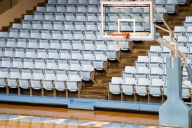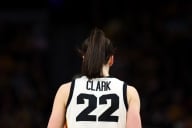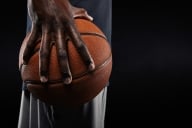You have /5 articles left.
Sign up for a free account or log in.
WASHINGTON -- The moderator came equipped with a referee's hat, whistle and penalty flag, and while he didn't have to use them, there was no shortage of aggression here last night in an American Enterprise Institute debate on whether modern college athletics exploits students.
"The [National Collegiate Athletic Association] is a cartel," squawked the Pulitzer-Prize winning journalist and historian Taylor Branch. "The students have no stake in their own enterprise."
"I don't feel sorry for them," the former Louisiana State University System President John V. Lombardi shot back, all but mocking the privileges athletes get in the form of full-ride scholarships, equipment, training and academic support. "When I talk to students in my [intercollegiate sports] class.... well, they all think it's a pretty damn good deal, and they wish they had it."
Branch, author of last year's explosive Atlantic expose "The Shame of College Sports," said the system operates in a "casino mentality," called the NCAA's amateurism model "bogus," and flat-out railed on the association. "The notion of a student-athlete is a fiction created by the NCAA -- by its own admission -- to beat workman's comp cases in court. It's neither here nor there, neither student nor athlete," Branch asserted.
"The ones that perform as students and athletes -- they deserve enormous respect," Branch said. "What we give them is boos and whispers and a little, condescending, 'You're lucky to get your scholarship.' To me, it's fundamentally wrong and it's un-American."
"You turn people loose in the market place and you're going to get an operation that's worse than what we have now," Lombardi countered, noting that the massive commercialization and revenue distribution that characterizes big-time college football (and to some extent basketball) supports the rest of the sports teams that bring in zero dollars. "The real key is it allows the program to succeed."
To those who have followed the raging debate this year, which many critics say has resulted in a loss of public confidence in the NCAA -- whose membership and governance, remember, is composed not of some faceless bureaucrats but of the college presidents themselves -- none of last night's zings came as a surprise.
- Despite the massive attention paid and institutional focus on sports programs, only 22 athletic departments actually make money.
- Athletes, despite a rules change last October that permits colleges to increase the size of their athletics scholarships by $2,000, in many cases receive nowhere near enough to cover the full cost of attendance.
- Meanwhile, the NCAA and its member universities get $771 million each year simply from college basketball television contracts. Conferences and universities stand to make similar amounts under the impending football playoff system. Athletes don't get a penny.
-
Even as concern over the dangers of head trauma grows, football players put their health at risk every time they step on the field, often in hopes of going pro, when very, very few percent of those players do (estimates range from 0.5 to just under 2 percent).
The penalties the NCAA lays on colleges that violate rules are often disproportionate and can seem arbitrary. (Just look at Penn State: "[Principled] penalties would have said, Penn State needs to have 20 fewer assistant coaches, 20 fewer assistants to the president," Branch said. "Instead, who did they penalize? They penalize 20 fewer scholarship for people who are still in high school and have nothing to do with it." The NCAA did also fine the university $60 million.)
The NCAA says its amateurism model "is crucial to preserving an academic environment in which acquiring a quality education is the first priority." It is why athletes can neither accept any special benefits from others -- why "their mother can't get a Christmas card from a sports agent," as Branch noted -- nor make any extra cash selling trophies, jerseys and the like.
It's why they're forbidden from contracting with or even contacting professional teams and sports agents, or receiving a salary for participating in college sports. Students and programs that violate these rules can receive harsh penalties because the rules, the NCAA says, protect athletes from exploitation by commercial enterprises. (Branch likened the regulations to policies one would find in North Korea.)
For some athletes, the gripes don't stop at graduation. One topic that Branch and Lombardi covered was the issue of "likeness," or the ability of the NCAA and others to make money not just while athletes are playing but also long after they've graduated (or transferred, gone pro or dropped out), by selling clothing and paraphernalia that uses athletes' jersey numbers or otherwise alludes to the individual.
The high-profile Ed O'Bannon case, currently moving through the courts, could declare that athletes should make money from those sales. But why should athletes be treated any differently from the rest of students, Lombardi asked, pointing in his defense to colleges earning many thousands of dollars -- not to mention publicity and prestige from high-profile inventions and devices -- on the backs of graduate students who conduct research.
"The idea that you can attack the NCAA and somehow fix this misses the point.... It's not an NCAA problem, it's an education problem. We own the NCAA; we are the NCAA," Lombardi said. "Now, if the university presidents and their trustees and their regulatory and their faculty want to change the system, all they have to do is change it."
Lombardi closed the debate with an observation that's hard for anyone to argue: the very people who condemn the NCAA are all too often quick to turn on the TV on Saturdays to watch the big game.
"The enemy is us -- the enemy is us. It is the universities, it is the fans, it is us, all of you who watch it on television.... You should take full responsibility for your participation," he emphatically informed the audience -- including the reporters who eat up college sports coverage while ignoring the rest of higher education. "Does the history department have its own section in the newspaper? Hell, no."








